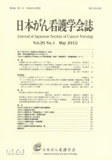Japanese
English
- 販売していません
- Abstract 文献概要
- 参考文献 Reference
- サイト内被引用 Cited by
要旨
本研究の目的は,食道切除術後の回復過程において補助療法を受けた患者の術後生活再構築過程を明らかにし,看護実践への示唆を得ることである.対象は,食道がん治療目的で食道切除術を受け退院後6カ月以上経過し,術後補助療法が終了している外来通院中の患者22名である.外来受診時に半構成的面接を行い,修正版グラウンデッド・セオリー・アプローチの手法を用いて分析した.
その結果,食道切除術後の回復過程において術後補助療法を受けた患者の術後生活再構築過程は《生活圏の狭小化》および《命と引き替えに生活圏の狭小化を受け入れ自分流の暮らし方を獲得する》をコアカテゴリーとする過程として説明できた.この過程は,【予想をはるかに超えて苦痛と化した摂食・嚥下行動】が引き起こす『元には戻りそうにない実感』から始まっていた.この実感を『食べられなくなるのは当たり前』と捉える患者がいる一方で,『食道の手術を受けたことの意義を自問する』ことと『誰にでも起こることかどうか思い迷う』気持ちが交錯するが『食事にまつわる症状を他患と比べる』ことで納得する患者もいた.前者・後者ともにこの段階で『命と引き替え』と言い聞かせ,『今まで通り暮らしていくことの難しさ』に直面しながらも『周囲の期待を回復への糧にする』気持ちで『食べる量を増やすための試行錯誤を重ねる』試みを続けていた.しかし,この試みは術後補助療法により長期化し,これが『失職に伴う経済的困窮への懸念』および【活動可能範囲の狭まり】をもたらしていた.しかし,患者は,『命と引き替え』と言い聞かせたことを想起し自分の身体状況を客観視することで『時間の経過に伴う回復の実感』および『摂取可能量増加に伴う回復への期待』が生まれ,『これまでの生活を改め,健康に留意した生活を送る』という新たな価値観を身につけ,『慣れる努力をしつつ自分流の暮らし方を探す』ことで最終的に生活の再構築に至っていた.また,術後に生じた【転移・再発・新たな部位へのがん発症への怯え】が常に患者の心の根幹に存在していた.
Abstract
The aims of the present study were to clarify post-operative lifestyle restructuring by patients receiving adjuvant therapy during the post-esophagectomy recovery process and to obtain practical nursing suggestions. Subjects comprised 22 outpatients who had completed post-operative adjuvant therapy and who had been discharged from hospital for at least 6 months following esophagectomy for esophageal cancer. Semi-structured interviews were conducted during outpatient visits and data were analyzed using the modified grounded theory approach.
Results revealed that the process of post-operative lifestyle restructuring by patients receiving adjuvant therapy during post-esophagectomy recovery could be explained by the core categories of 'narrowing of sphere of daily life' and 'accepting narrowing of sphere of daily life and acquiring a personalized way of life in exchange for being alive'. This process began with the subcategory "realization of unlikelihood of returning to original state" caused by "considerably greater pain than expected and damaged eating and swallowing behavior". Although some patients perceived this realization as "loss of eating ability is only to be expected", others had mixed feelings of "self-questioning regarding the meaning of undergoing esophageal surgery" and "inability to decide whether this was something that could happen to anyone" but were satisfied by "comparing food-related symptoms with other patients". Both of these patients groups talked at this stage about "exchange for being alive" and while facing "difficulty living life as before" they continually attempted "to increase their food intake through trial and error" with the feeling of "pressure to recover from surrounding expectations".
However, these attempts were protracted compared to post-operative adjuvant therapy and this caused "anxiety regarding economic hardship caused by loss of employment" and "narrowing of functional range". However, through recalling their talk of "exchange for being alive" and objectively viewing their physical status, patients developed "realization of recovery over time" and "expectations of recovery accompanying increase in food intake capacity". They acquired a new set of values comprising "changing lifestyle to date" and "living a health-based lifestyle", and by "searching for a personalized way of life while trying to adapt", they ultimately achieved lifestyle restructuring. Post-operative "fear of metastasis, relapse and cancer onset at a different location" constantly constituted a core part of the patient's mental state.
Copyright © 2012, Japanese Society of Cancer Nursing All rights reserved.


